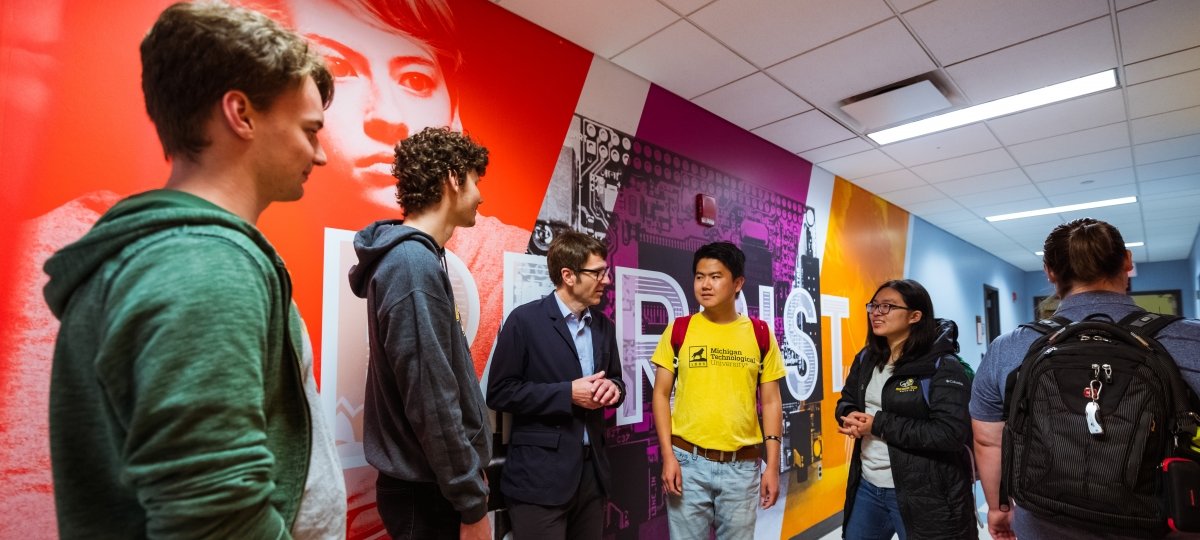Applied computing is a multidisciplinary field that blends the theoretical and practical aspects of computing to solve day-to-day business and industry problems—integrating computing with other subjects such as computer networks, cybersecurity, electrical engineering technology, healthcare, information systems, data science, industrial automation, network administration, robotics, and more.
What's The Difference Between Applied Computing and Computer Science?
Applied computing and computer science are separate disciplines, but there is considerable overlap between the two fields. Applied computing concentrates on real-world applications, such as, how to use skills in a business setting, how to manage technology projects, and how to communicate effectively with other professionals in the workplace. Applied computing professionals work as as software engineers, systems analysts, cybersecurity specialists, electrical engineers, video game designers, and many other professions.
Computer science focuses more on the theoretical underpinnings of computing with knowledge of technical processes and theories, such as algorithms, artificial intelligence, and natural language processing. Computer scientists may also know advanced mathematics to help them understand these theories. Those in the computer science field often pursue advanced degrees, research or teaching positions in academia, or careers in business, industry, and government as research fellows, data scientists, cryptanalytic computer scientists, and more.
Applied Computing
- Practical. Applied computing focuses on real-world implementation of computer science principles.
- Takes a more hands-on approach—using technology and computer science principles for practical applications in various industries.
- Those interested in practical software development may gravitate toward applied computing.
Computer Science
- Theoretical and foundational. Computer scientists often choose to pursue graduate degrees.
- Uses mathematical algorithms, coding procedures, and programming skills to study computer processes and develop software and systems.
- Those wanting to learn about computing theory may prefer computer science.
What Do Applied Computing Students Learn?
Applied computing students use technology to solve day-to-day organizational problems by:
- Developing technical knowledge and real-world skills in informational technology, programming languages, web development, and more.
- Focusing on critical and analytical thinking, applied skills, and problem-solving.
- Completing technical coursework and learning how to apply their knowledge in a business or industrial setting.
- Learning how to manage technology projects and communicate effectively with other professionals in the workplace.
- Blending theoretical and practical knowledge.
- Many applied computing degree programs require a capstone project that showcases the student's applied computing skills.
What Are Some Of The Soft Skills Applied Computing Professionals Need?
Applied computing professionals benefit from having soft skills such as:
- Attention to detail
- Business leadership and project management skills
- Professional communication skills
- Critical thinking, analytical, and problem-solving skills
- Coding skills and proficiency in programming languages
- Creativity
- Ability to use logic and mathematics
- Organizational skills
- Troubleshooting abilities
What Are Some Of The Careers In Applied Computing?

Applied computing professionals work in virtually all economic sectors, meaning job opportunities are virtually endless. Some applied computing careers include:
Cybersecurity Specialist
Cybersecurity professionals monitor networks for security breaches and investigate violations. They install and use software to protect sensitive information and conduct penetration testing to reveal security gaps. They document security breaches, research information technology security trends, and develop security standards and best practices.
Database Administrator
Database administrators maintain the computer systems that store and retrieve information. Using data science, they help develop and program a system's infrastructure so users can search for and find the information they need. Database administrators may create software upgrades and other modifications to protect the system from potential data breaches.
Electrical Engineer
Electrical engineers with applied computing backgrounds typically work in the field to maintain electric voltage systems and their individual components, such as heaters, motors, circuits, and generators. They install wiring systems, circuit boards, and electrical control systems. They plan project timelines, calibrate equipment, and program electronic controls.
Video Game Designer
Video game designers create the defining features of video games, including characters, objectives, obstacles, levels and settings, and narratives. They brainstorm ideas, build prototypes, create interactive narration, and develop the game's mechanics. They often collaborate with programmers, artists, animators, and other designers.
Health/Medical Informaticist
Informatics specialists work at the intersection of information science, computer science, and health care. They use data analytics and artificial intelligence to develop insights and drive innovations in the health care industry. They develop new medical technology, design public health strategies, and digitize of health care records, systems, and processes.
Mechatronics Specialist
Mechatronics specialists help manufacturers remain safe, fast, competitive, and diversified. They troubleshoot, maintain, and develop products and systems that rely on interconnected systems using knowledge in engineering and engineering technology, system-level thinking, mechanical systems, electronics, computers, programming, cybersecurity, human-machine interaction, and more.
Robotics Engineer
Robotics engineers build machines that replicate human actions. They design prototypes, build and test machines, and maintain the software that controls them. They may also do research to find the most cost-efficient and safest process to manufacture their robotic systems. Robotics engineers work in industries such as mining, manufacturing, automotive, services, and more.
Software Engineer
Software engineers take a practical approach to software design and development using both computer science principles and established engineering practices. They create software products with an emphasis on reliability, usability, need, and cost-effectiveness. Software engineers find careers in virtually all business and industry sectors.
System Administrator
A system administrator is responsible for the day-to-day operation of an organization's computers and computer networks. They may oversee both networks and systems, but they often specialize in one or the other. They install, configure, manage, monitor, and optimize network hardware and software. They make needed upgrades and repairs, and ensure systems are operating correctly. They may research computing tools, develop policies and procedures for using and maintaining the network, and provide support to users.
How Much Do Applied Computing Professionals Earn?
Computer and information technology is one of the fastest-growing fields in the country.According to data from the Bureau of Labor Statistics, the demand for computer and information technology roles is projected to grow much faster than the average for all occupations between 2023 and 2033. The Occupational Outlook Handbook projects about 356,700 openings each year in these occupations.
| Career | Degree Options | Mean Entry-Level Salary (Payscale) | Mean Annual Wage (BLS) | Top 10 Percent (BLS) |
|---|---|---|---|---|
| Computer Hardware Engineer | $76,707 | $156,770 | $223,820 | |
| Computer and Information Systems Manager | $65,570 | $187,990 | >$239,200 | |
| Computer Network Architect | $70,000 | $135,890 | $198,030 | |
| Computer Network Support Specialist | $79,610 | $124,470 | ||
| Computer Systems Analyst | $60,865 | $111,960 | $166,030 | |
| Database Administrator | $61,445 | $107,440 | $160,890 | |
| Database Architect | $85,612 | $142,620 | $209,990 | |
| Electrical and Electronic Engineering Technologist or Technician | $78,580 | $111,790 | ||
| Electro-Mechanical and Mechatronics Technologist and Technician | $75,710 | $109,580 | ||
| Electronics Engineer | $76,563 | $124,810 | $181,390 | |
| Information Security Analyst | $63,458 | $127,730 | $186,420 | |
| Network and Computer Systems Administrator | $56,451 | $101,190 | $150,320 | |
| Software Developer | $68,973 | $144,570 | $211,450 | |
| Web Developer | $57,174 | $98,790 | $162,870 | |
|
Figures from payscale.com, accessed April 2025. Figures from U.S. Bureau of Labor Statistics (BLS), dated May 2024. |
||||
Pursuing an Applied Computing Degree
There are several paths you can take to start your career in an applied computing profession. Most entry-level positions require at least a bachelor's degree. The following tips can help prepare you to pursue a degree in an applied computing field.
Tips for High School Students
If you're currently in high school and are considering a career in an applied computing field, here are some things to consider:
- Focus on your computer and math classes, as these will form the basis for your applied computing education. Courses related to robotics may also help you prepare. Your enjoyment (or not!) of these courses can help you decide if an applied computing is right for you.
- Research several different applied computing degrees to get a sense for the ones you may want to pursue.
- Talk with your teachers, school advisor, parents, friends, and classmates about your choices to get some new perspectives.
Choosing a College/University for Applied Computing
Selecting a school to study an applied computing field can be a difficult decision. Follow these tips to help you:
- Research colleges and universities that offer applied computing degree programs. It's not necessary to major in a program called "applied computing" to start a successful career in this job sector. Look for degrees that fall under the applied computing umbrella.
- Make sure the schools you're considering offer accredited degrees. Many employers will only consider graduates from such institutions.
- Visit the schools you're interested in and ask lots of questions about the degree program(s), scholarships and financial aid opportunities, and application requirements and deadlines.
- Consider the school's reputation location, and size; the total cost of attendance; and student housing options.
- Find out about campus life, academic support, career services, class sizes, and internship opportunities at the colleges you are considering.
- Apply to the schools you think are the right fit beginning in your junior year of high school. Don't miss the application and other deadlines!
Tips for College Students
If you're currently in college, consider these tips to help ensure your success in your chosen applied computing field:
- Work with your academic advisor to choose the appropriate program and courses that will give you the knowledge and skills you'll need for a career in an applied computing field.
- Gain experience in applied computing activities like student organizations, co-ops and internships, professional conferences, and research projects at your institution.
- Form relationships with faculty members in your program. These connections will help you to find relevant applied computing experiences and jobs, both during college and after you graduate.
- Network with professionals. Whether you're at a conference or an on-campus career fair, seize every opportunity to form connections with professionals in the field—you never know when these contacts could come in handy!
- Keep your resume up to date and brush up on your interviewing skills. Your institution may even have a dedicated career center that can help you.


